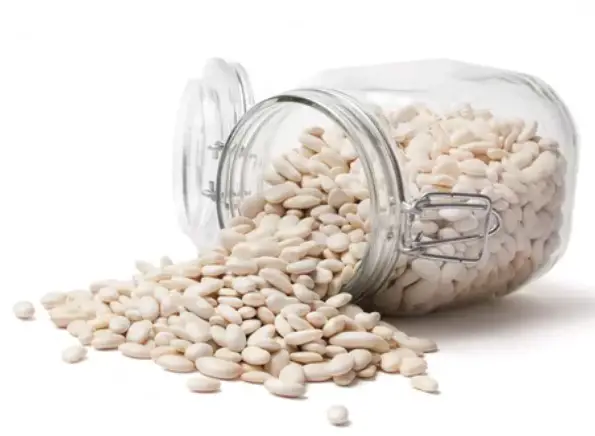White kidney beans, also known as cannellini beans, are a popular legume that is widely used in Mediterranean cuisine.
These beans are large, oval-shaped, and have a creamy texture. They are often used in soups, stews, salads, and pasta dishes.
White kidney beans are a good source of protein, fiber, and complex carbohydrates.
They are also low in fat and calories, making them a healthy addition to any diet. In addition, they contain a variety of vitamins and minerals, including iron, potassium, and folate.
One of the unique properties of white kidney beans is their ability to block the absorption of carbohydrates. This is due to the presence of an enzyme inhibitor called phaseolamin.
This property has led to the development of white kidney bean extract supplements, which are marketed as weight loss aids. However, more research is needed to determine their effectiveness and safety.

What Are White Kidney Beans
Appearance
White kidney beans, also known as cannellini beans, are oval-shaped legumes that are creamy and white in color.
They have a smooth texture and a mild, nutty flavor that makes them a popular ingredient in many dishes.
The beans are typically harvested when they are fully mature and have a firm texture.
They are then dried and packaged for sale. When cooked, white kidney beans have a tender yet slightly firm texture and a creamy interior.
White kidney beans are often used in soups, stews, and salads.
They can also be mashed and used as a base for dips and spreads. In addition, they are a common ingredient in Italian cuisine, particularly in dishes such as pasta e fagioli and minestrone soup.
Nutrition Facts
White kidney beans are a great source of nutrition for those looking to maintain a healthy diet.
They are low in fat and high in protein and fiber, making them a great addition to any meal. Here are some of the nutrition facts for white kidney beans:
| Nutrient | Amount per 100g |
|---|---|
| Calories | 333 |
| Protein | 24g |
| Fat | 1g |
| Carbohydrates | 60g |
| Fiber | 24g |
| Sugar | 1g |
| Sodium | 24mg |
White kidney beans are also a good source of several vitamins and minerals, including:
- Iron
- Magnesium
- Phosphorus
- Potassium
- Zinc
- Vitamin B6
Consuming white kidney beans can help lower cholesterol levels and reduce the risk of heart disease.
The fiber in white kidney beans can also help regulate blood sugar levels and promote digestive health.
Health Benefits
White kidney beans are not only delicious but also packed with nutrients that offer a range of health benefits. Here are some of the benefits of consuming white kidney beans:
- Rich in fiber: White kidney beans are an excellent source of dietary fiber, which helps regulate bowel movements, lower cholesterol levels, and reduce the risk of heart disease.
- Good for weight management: White kidney beans are low in calories and high in fiber, making them an ideal food for weight management. The fiber in white kidney beans helps you feel fuller for longer, reducing the urge to overeat.
- Regulates blood sugar levels: The high fiber content in white kidney beans slows down the absorption of glucose, preventing sudden spikes in blood sugar levels. This makes them an excellent food choice for people with diabetes.
Moreover, white kidney beans are also rich in antioxidants, vitamins, and minerals that play a crucial role in maintaining good health.
| Nutrient | Amount per 100g |
|---|---|
| Protein | 9g |
| Fiber | 7g |
| Iron | 2mg |
| Calcium | 68mg |
Overall, white kidney beans are a healthy and nutritious food that should be included in your diet.
However, it’s essential to cook them properly to avoid any digestive discomfort.
Soaking the beans overnight and boiling them for at least 10 minutes can help reduce the levels of lectins, a type of protein that can cause digestive issues.
How to Cook White Kidney Beans
White kidney beans are a versatile ingredient that can be used in a variety of dishes.
They are a great source of protein, fiber, and other nutrients, making them a healthy addition to your diet. Here are some simple steps to follow when cooking white kidney beans:
- Sort and rinse the beans: Before cooking, sort through the beans to remove any debris or stones. Rinse them thoroughly under cold water.
- Soak the beans: Soaking the beans overnight will help to reduce cooking time and make them easier to digest. To soak, place the beans in a large bowl and cover with water. Let them soak for at least 8 hours or overnight.
- Cook the beans: Drain the soaked beans and rinse them again. Place them in a large pot and cover with fresh water. Bring the water to a boil, then reduce the heat and simmer for 60-90 minutes, or until the beans are tender. Skim off any foam that forms on the surface of the water during cooking.
- Season the beans: Once the beans are cooked, you can season them with salt, pepper, garlic, herbs, or other seasonings to taste. Serve them as a side dish, or use them in soups, stews, salads, or other recipes.
White kidney beans can also be cooked in a slow cooker or pressure cooker for added convenience.
They are a great addition to vegetarian and vegan diets, and can be used as a meat substitute in many recipes.
Experiment with different seasonings and cooking methods to find your favorite way to enjoy white kidney beans!
Precautions and Side Effects
While white kidney beans can be a healthy addition to your diet, there are some precautions and potential side effects to keep in mind.
Firstly, if you are allergic to beans or legumes, you should avoid consuming white kidney beans altogether.
Allergic reactions can range from mild to severe and can include symptoms such as hives, swelling, and difficulty breathing.
If you experience any of these symptoms after consuming white kidney beans, seek medical attention immediately.
Additionally, white kidney beans contain a compound called lectin, which can be toxic in large amounts.
While cooking white kidney beans can help reduce the amount of lectin present, it is important not to consume raw or undercooked beans. Symptoms of lectin toxicity can include nausea, vomiting, and diarrhea.
Finally, white kidney beans may interact with certain medications, including diabetes medications and blood thinners.
If you are taking any medications, it is important to speak with your healthcare provider before adding white kidney beans to your diet.
Relayed post: White beans with black spots
Conclusion
White kidney beans are a type of legume that is commonly used in cooking.
They are rich in nutrients such as fiber, protein, and iron, and can provide a variety of health benefits when consumed as part of a balanced diet.
While some studies suggest that white kidney beans may have weight-loss and blood sugar-lowering properties, more research is needed to fully understand these potential benefits.
Additionally, it is important to note that consuming large amounts of raw or undercooked white kidney beans can be harmful due to the presence of a toxin called phytohaemagglutinin.
Overall, white kidney beans can be a healthy and tasty addition to your diet.
They can be used in a variety of dishes, including soups, stews, salads, and dips. When cooking with white kidney beans, it is important to ensure that they are cooked thoroughly to avoid any potential health risks.




